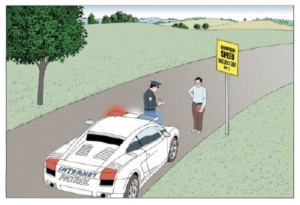
The article, “Is Google Making Us Stupid”, is by Nicolas Carr. According to his website, Carr writes about technology and culture (“Home”). Carr not only writes articles for The Atlantic, but according to his website, “…for the Wall Street Journal, the New York Times, Wired, Nature, MIT Technology Review, and many other periodicals” (“Home”). Carr holds a college degree and is a “…former member of the Encyclopedia Britannica’s editorial board of advisors” (“Home”). Based off of the information from his website, Carr is a trustworthy author because of his expertise on multiple topics, his education level, and his effectiveness throughout all his articles. This particular author addresses his audience in these ways.
In the article, “Is Google Making Us Stupid?”, Carr argues that the internet is causing humans to face troubles when reading from a book. The primary audience of this article is students, parents, teachers, or doctors. The secondary audience is anyone interested in learning how the brain works, or anyone who uses the internet, in general. The age group for this article could range from 16-65. The ads displayed on the web, suggest that the audience must be in high school or been through it and have some knowledge relating to them. In addition to the ads, Carr uses sophisticated word choice, only a person with reading experience
 can read. Based off his word choice here, “…still await the long-term neurological and psychological experiments that will provide a definitive picture of how Internet use affects cognition…” (Carr, “Is Google Making Us Stupid?”), it’s clear to say that’s true. However, it’s important to know why he wrote this article.
can read. Based off his word choice here, “…still await the long-term neurological and psychological experiments that will provide a definitive picture of how Internet use affects cognition…” (Carr, “Is Google Making Us Stupid?”), it’s clear to say that’s true. However, it’s important to know why he wrote this article.
 Image of higher level word choice.
Image of higher level word choice.
The purpose of this article is to inform the world that the internet is causing troubles when reading into a book, known as the “traditional sense”. However, Carr is promoting a message that the internet is forcing problems onto to humans we may or may not notice, but also mention the advantages of using the web. He says, “Our ability to interpret text… remains largely disengaged” (Carr, “Is Google Making Us Stupid?”). The internet is triggering unknown habits. Carr’s primary intentions is to inform the reader of the advantages and disadvantages of reading online. His secondary intention is to persuade the readers to read online, but also to continue reading on paper. He’s suggesting that you should read specific texts on paper and others online. Nonetheless, whether you read more online or not, it’s essential to know why Carr says what he says.
The article, “Is Google Making Us Stupid” was written in July/August of 2008. Typically, this article would be read in a classroom, on a computer, and/or a tablet or phone. This article would most likely be published in a magazine or at a school, or doctor’s office. This article may also be a link on social media. Carr formats his article in a way that keeps the reader’s attention. He uses images, such as interesting colorful ads after each couple paragraphs. Also, he utilizes highlighted words, names, phrases, and/or titles of texts.
 Like other internet articles, this article contains, ads, pictures relating to the topic of the article, and highlighted words. The Atlantic magazine “…publish factual information that utilizes loaded words (wording that attempts to influence an audience by using appeal to emotion…” (“Left-Centered Bias”). Unlike other sources, this article really doesn’t display any bright colors, besides the pictures under the paragraphs. However, the picture where you first start reading the article is brightly colored and looks like it could be hand drawn or painted. The image displays a man, “internet patrol” giving another man a ticket. This picture gives an comical aspect to Carr’s article because it shows us how the internet controls our life.
Like other internet articles, this article contains, ads, pictures relating to the topic of the article, and highlighted words. The Atlantic magazine “…publish factual information that utilizes loaded words (wording that attempts to influence an audience by using appeal to emotion…” (“Left-Centered Bias”). Unlike other sources, this article really doesn’t display any bright colors, besides the pictures under the paragraphs. However, the picture where you first start reading the article is brightly colored and looks like it could be hand drawn or painted. The image displays a man, “internet patrol” giving another man a ticket. This picture gives an comical aspect to Carr’s article because it shows us how the internet controls our life.
The font of the title, subtitles, and captions, all use different fonts. In the opening page of the article, there is a big heading in bold text that captures the reader’s attention. The entire article is written in Times New Roman font, besides the subtitle, the author’s name, and the issue date. Although, the article was straightforward and easy to navigate, I wish the article wasn’t as long as it is because it did become difficult to keep my attention. In spite of that, Carr’s article did supply its readers with sufficient evidence.
To sum up, the article, “Is Google Making Us Stupid” was very convincing. I was convinced because Carr’s use of numerous sources to defend his claims, his expertise of this topic, and his effectiveness with making his claims. Carr’s article persuaded me because he was able to convince me to continue reading online, but also to keep reading on paper too.
